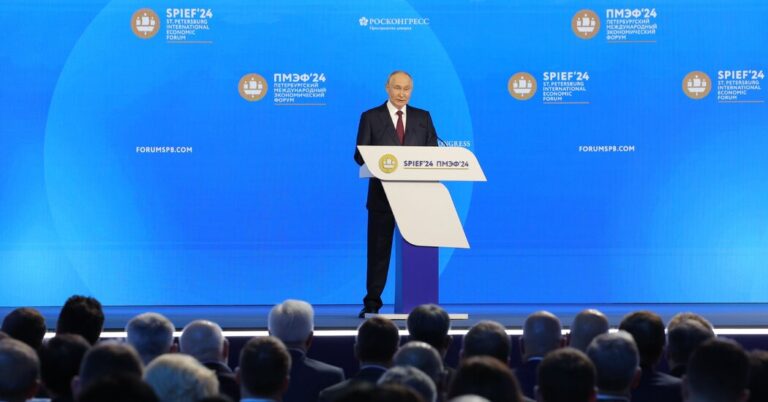President Vladimir V. Putin of Russia said on Friday that even the combined arsenals of Europe and the United States would be no match for Russia’s in a nuclear confrontation, but that “I hope this is never going to happen.”
He reasoned that Moscow’s supremacy in the Ukraine war has made that grim scenario unlikely.
“The use is possible in an exceptional case — in the event of a threat to the sovereignty and territorial integrity of the country,” Mr. Putin told a large audience of the Russian elite and foreign dignitaries gathered for the main session of the four-day St. Petersburg International Economic Forum. “I don’t think that such a case has come.”
As Mr. Putin spoke, President Biden was in Europe to mark the 80th anniversary of D-Day, when Allied forces stormed the beaches of Normandy, leading eventually to the defeat of Nazi Germany. The Russian assault on Ukraine meant the stakes were equally high today, Mr. Biden said, suggesting that the voices of the fallen “are summoning us” to defend Western values.
At the annual gathering in St. Petersburg, Mr. Putin invariably presents a long, glowing assessment of Russia’s domestic and foreign affairs, and this year was no exception. The country’s economy was growing despite a battery of Western sanctions, he said, and Russia was fostering an alternative to the American-dominated global financial order as Moscow’s armed forces were prevailing on the battlefield.
“Mr. Putin is a great master at selling optimism, and this is a whole strategy — in Russia today, optimism is the official religion and mandatory state ideology,” said Kirill Rogov, a former Russian government adviser who now leads Re: Russia, a Vienna-based policy research organization. Many of the positive economic indicators are driven by massive government spending on defense industries, he noted.
Given the large foreign presence at the forum, Mr. Putin often uses a more measured tone than when he is addressing a strictly domestic audience. The hawkish moderator, Sergei Karaganov, a prominent political scientist, repeatedly pressed Mr. Putin to agree that the nuclear option was the best way to win the war, that Russia should hold “a nuclear pistol to the temple” of the West.
In 1993, Russia abandoned the Soviet pledge of no first use of nuclear weapons, fearing its weakened military forces could not deter an American attack, however unlikely. While noting that Russia’s nuclear doctrine could change, Mr. Putin swept aside Mr. Karaganov’s remark.
“We don’t have that need,” he said of using nuclear weapons as a last resort to preserve national sovereignty. “Because our armed forces are not just gaining experience, they are increasing their effectiveness.”
Mr. Putin suggested that saber rattling was counterproductive, although Western countries have accused him of doing just that back in 2022, when the tide was running against Russia in the war and again, recently, after the U.S. allowed Ukraine to use American weapons against military targets in Russia. “I would like to ask everyone not to speak of the possibility of using nuclear weapons in vain,” he said.
When Mr. Karaganov asked the president whether a negotiated settlement was possible even with what the moderator called unreliable interlocutors like the West and Ukraine, Mr. Putin quoted Stalin, saying that sometimes there was no alternative. Mr. Putin also repeated the idea that the government of Ukraine was illegitimate because President Volodymyr Zelensky’s five-year term had expired and new elections were postponed amid the war.
Mr. Putin also suggested that any peace treaty would have to be negotiated along the lines of previous agreements in Minsk and Istanbul. Neither of those succeeded in preventing the conflict.
While Mr. Zelensky participated in the D-Day commemoration on Friday, Russia was not invited, despite its instrumental Allied role in World War II. Some Russian commentators took umbrage. Olga Skabeeva, a prominent Russian propagandist on state television, mocked Mr. Biden in a post on the Telegram messaging app, saying that “he went into a trance and contacted the souls of dead World War II veterans.”
Others, however, noted how changes at the St. Petersburg International Economic Forum showed just how much Russia’s 2022 invasion of Ukraine war had isolated the country. That has made the Kremlin desperate for any allies, even the Taliban rulers of Afghanistan once ostracized by Moscow as a terrorist organization. China and India, both major purchasers of Russian oil, did not send high-level delegations.
“Once dubbed ‘Russia’s Davos’ and attended by democratically elected presidents and the CEOs of major global corporations, this year’s guest list is looking distinctly more war-crimey,” the independent Novaya Gazeta newspaper, published outside Russia, wrote in a summary of the events.
One of the few frissons of excitement at the forum this year was the appearance for the first time of both Mr. Putin’s adult daughters on panel discussions, which have always featured a who’s who of the Russian elite.
The two women use different surnames, and the president has repeatedly declined to acknowledge publicly that Maria Vorontsova, 39, and Katerina Tikhonova, 37, were his daughters, even as both took prominent roles at public institutions.
Ms. Tikhonova, who first entered the public limelight years ago through international acrobatic rock ‘n’ roll dance competitions, spoke remotely to a panel on Thursday about the effort to substitute Russian products for imports, long a pet project for Mr. Putin. Her sister, Ms. Vorontsova, on Friday addressed the use of innovation in biotechnology. Neither was identified as Mr. Putin’s offspring.
Milana Mazaeva and Alina Lobzina contributed reporting.

